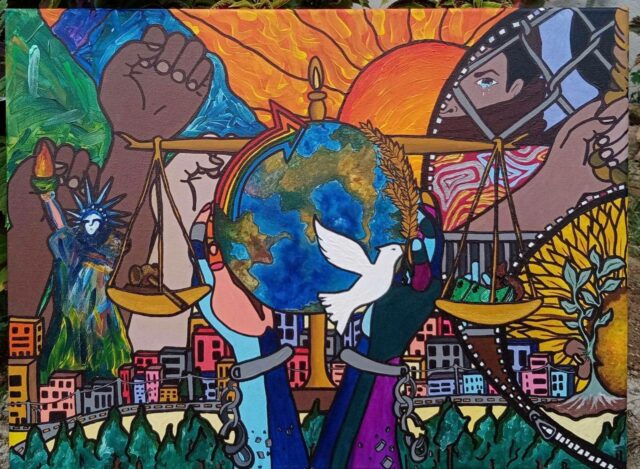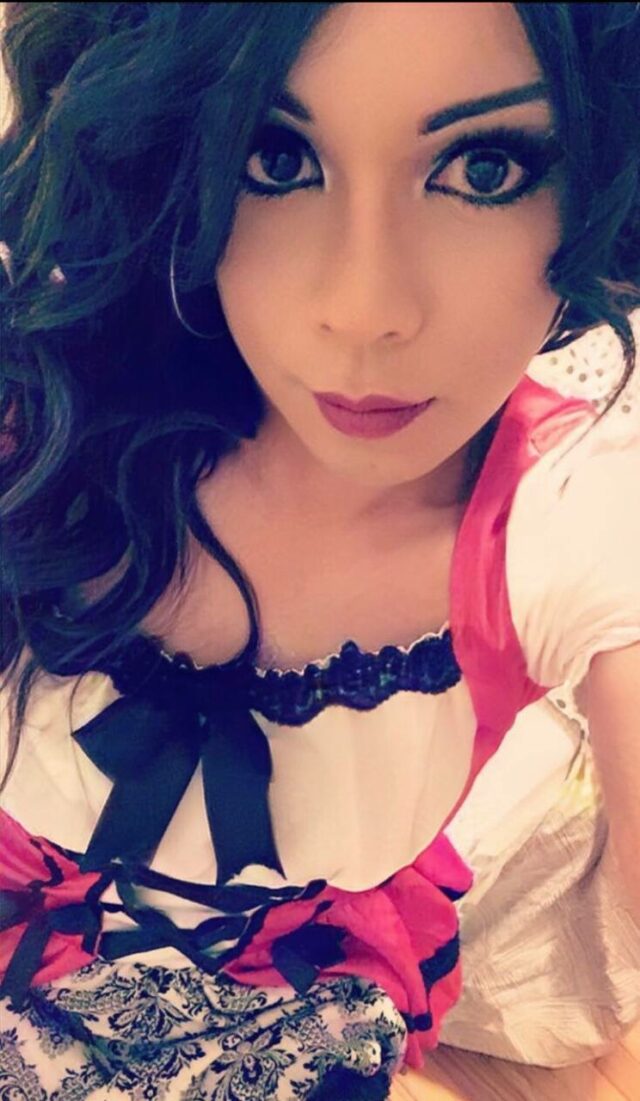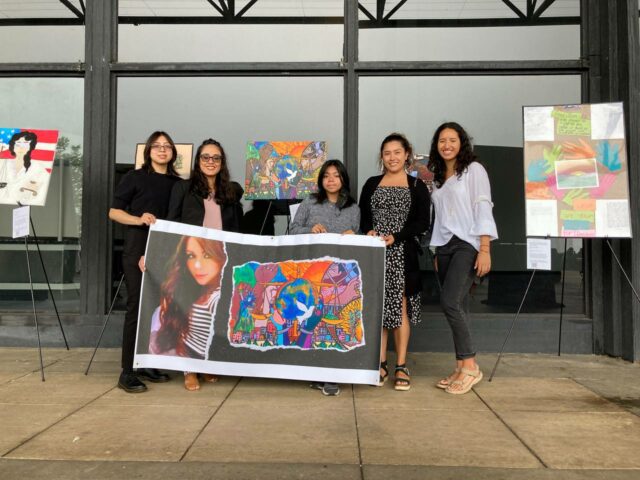The Justice System That Feeds Itself Easy Prey
Introduction
Jazmine Curtis∞
 1
1
ID: A colorful painting. In the center is the globe, surrounded by a dove carrying a stalk of wheat and a rainbow arrow curving alongside the globe’s bend. The globe is being held by two colorful hands, which are shackled. The globe is directly in front of a classical scale, with the left side containing a resting gavel, and on the right side dollar bills and a bag of money. The bottom of the painting is lined with trees, and above it a multicolored cityscape. To the left of the globe are three fists raised up in solidarity. In front of the fists is the Statue of Liberty, overlooking the cityscape. To the left of the globe is a person tearfully behind a fence, with a hand grabbing a lever in front of the fence; the entire image is framed by an unzipping zipper. To the very right is a growing plant in front of a sunflower. Behind the globe is a brilliant orange-red sun.
Navigating the criminal justice and immigration system in the United States can be a crucial, life-changing process, especially for those who cannot afford to hire a good lawyer. People with less income or with arrest histories are the people spending time behind bars for days, weeks, months or even years. People who cannot afford a lawyer are sometimes wrongfully convicted. How do we help these people? Based on my experience, I would like to share some ideas on how we can prevent this from happening in our communities and help those people in need.
Money is one of the main contributing factors to why people end up behind bars. Everything in this world seems to have to do with money. People often commit crimes because of money, money that they do not have to support themselves or their families. How can we prevent these incidents from happening in our community? What should we do to help those people in need?
Lack of education, knowledge, and (social) support are significant contributors to crime rates. These are compounding factors that work against a big portion of the population who usually do not understand the law. In those cases, people plead guilty to matters they should not have, matters that needed greater advocacy than what was within reach or achievable within the current system. Instead, they will accept the sentence against them and resign to the consequences. In some cases, this can even result in someone’s wrongful deportation. Why can’t we access substantive rehabilitation or help to understand the system?
What about repeat offenders? Should we lock them up to hope they change on their own? Will incarceration be what teaches them “the lesson”? The answer is no. People need help in accessing rehabilitation and education for the crime they committed. Building awareness about the root of criminal behavior is key. With awareness and education, any concerning behavior can be fairly addressed. By addressing behavior, we may have a better chance at rehabilitation and understanding. It is also important to consider psychiatric and psychological circumstances. Proper physical and emotional health evaluations may be a vital lifeline to accessing appropriate knowledge and support.
Family background and a lack of community support are other reasons why people commit crimes. Once a person has been arrested the system does not ask or consider: how did this particular person grow up? Did they have a good family or parents? What were their day-to-day living conditions? Do they live in a lower-income neighborhood? Are they surrounded by negative influences?
We should help every offender. People need guidance to find supportive communities. People with arrests and convictions should have a chance to re-enter everyday society. Systemically holding them back by withholding opportunities or chances to work in spaces where they would genuinely thrive, simply does not work. It only perpetuates the harm.
The justice system itself prevents individuals from moving forward. It constantly tells offenders that they are not good enough. It keeps us in an ongoing cycle based on past mistakes, subjecting us to judgment instead of fostering growth, rehabilitation, or healing. I have changed! I have a job! I am working. I am a contributor to the world! Why am I not given a chance to move on and live the full life I want? Don’t we deserve a chance? Shouldn’t we be lifting each other up?
It is not the justice system but our communities—including victims of crime–that help one another to forgive, grow, and heal. Opening up to those that we are comfortable with will remind our society that we are still human, and care is key to our progress. We should approach crime with education and love, rather than criticism or judgment. If the community can learn how to accept others, it gives everyone a chance to live again happily and peacefully. Harsh punishment does not change people and will not help them. We need to change our system by accepting them back to our community and giving them a chance.
As someone with a criminal record who has spent time in detention and paid their dues to society, I have lived and continue to survive the consequences of my mistakes. But I have been unable to live a normal life because of my past. The justice system did not help me.
I might not be in jail anymore, but I feel like I’m still locked up. Every day I wake up and I feel regret that won’t go away. Jail did not help me change, rather, it made me feel miserable and disgusted with myself. Jail exposed me to more trauma. Instead of helping me, it gave me pain, depression, and suicidal thoughts. In the system, I felt so hopeless and was continuously made to think that my life was over. Where was the rehabilitation? My terrible experiences made me want to make changes to help others not to suffer the same way I did. Sharing my experiences would be a pleasure if it could help someone. I might not be able to help everybody, but at least I can try to save one life at a time and be an example to everyone.
As an immigrant, I also wish everyone had access to a fair trial and justice, regardless of their citizenship or immigration status. People should have pathways to demonstrate their growth. Separating someone from their loved ones because of the mistakes they have made is not a solution. The immigration system should reasonably consider other factors.
The United States is a country of opportunity and second chances. Being an immigrant taught me so many things about life and changed me in a lot of positive ways. I love the people I have met in the United States especially their cultures and their inspiring mentalities.
I know I don’t have unlimited power, control, or money. Noncitizens in the US have fewer rights than everyone else: their rights, privileges, and access depend on paperwork. As a non-citizen, I have less access to control, power, and money. Regardless of my status, I nonetheless know that individually and collectively we can still make and propel change. Sharing our experiences is just one of those ways.
Small things we do for others can have a big impact on our community. I am hopeful that people will come to realize we are all one. We have the power to help each other. We have the power to imagine and build a better community. We can start by helping each other out, especially those who need us the most. Let us not use money as our power for everything.
We need access to equality and a fair justice system, regardless of who is facing it. We need to learn how to forgive and be kind to one another for a better future.

ID: Photograph of the author, Jazmine Curtis.

ID: Five people hold up a banner depicting Jazmine’s painting and a photo of Jazmine herself. Behind them is a canvas version of Jazmine’s painting on an easel. To their left and right are other paintings and pictures held on easels.
Suggested Reading
Attica Day
Today is “Attica Day.” It was exactly 50 years ago that the National Guard opened fire on prisoners and corrections officers in A-block yard.
Buried Alive Behind Bars
Image ID: a man standing in a jail cell, holding the steel bars in front of him.
Corona Drive-Through
A Washington prisoner gets a glimpse of small-town holiday Americana during the pandemic...